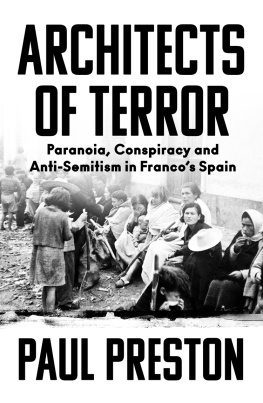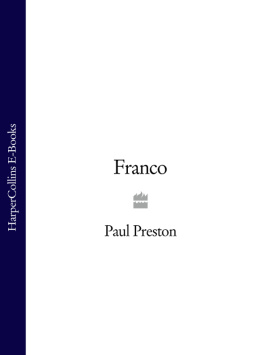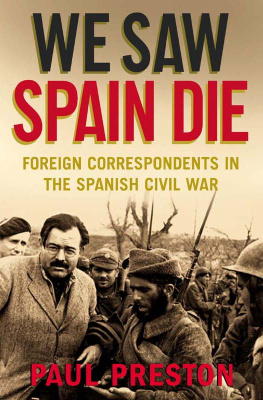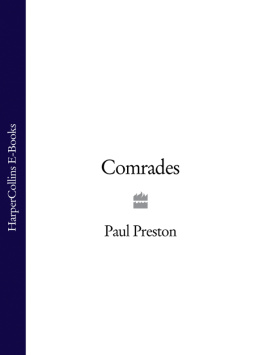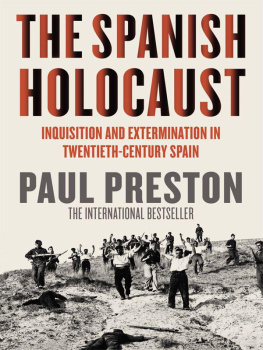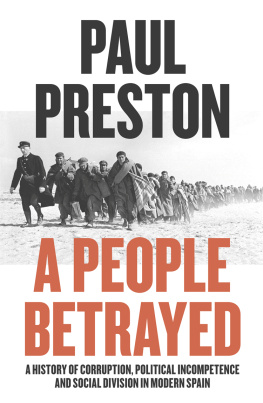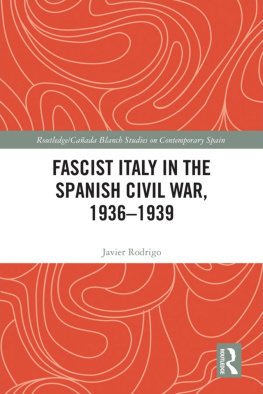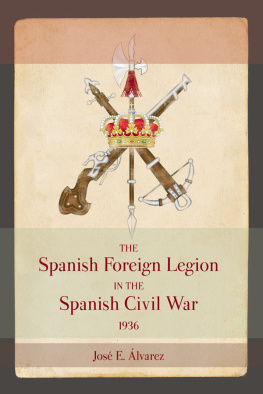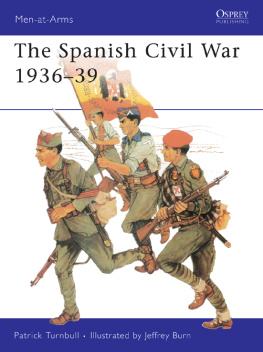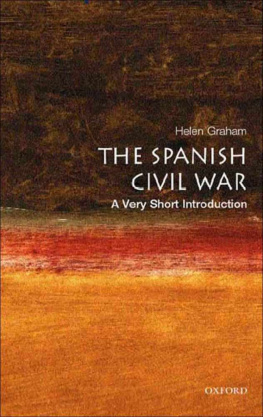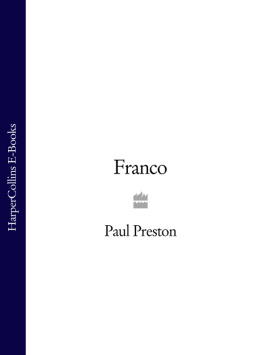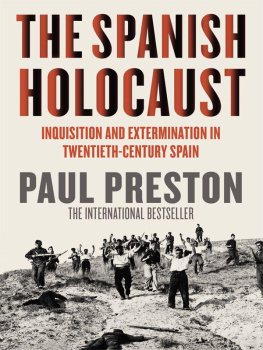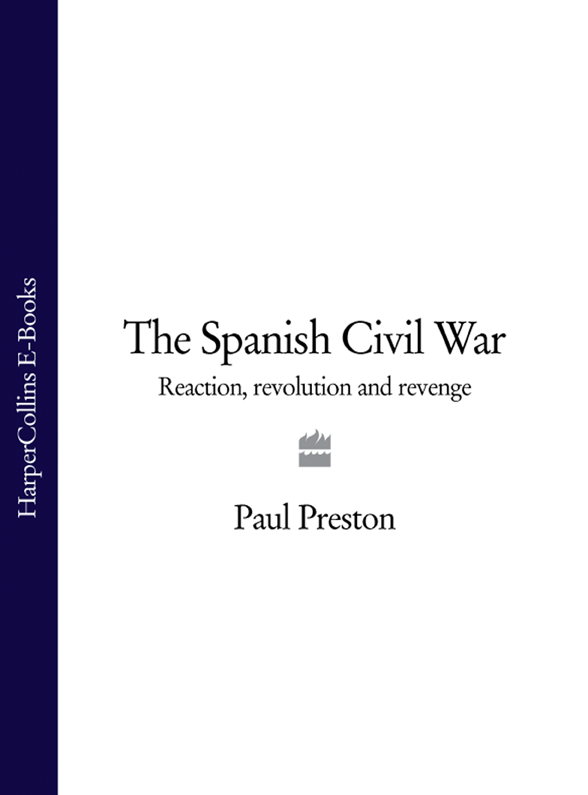
This book is dedicated to the memory of
David Marshall and to the other men and women of the International
Brigades who fought and died fighting fascism in Spain.
I wrote the first version of this book twenty years ago. My intention then was to provide the new reader with a manageable guide to the bibliographical labyrinth constituted by the fact that the Spanish Civil War has continued to be fought on paper. Even then there had been several thousand books on the Spanish Civil War and many of them were extremely long. Because the flow did not stop, I rewrote the book in 1996 in order to take account of what had been published in the ten years following its first appearance. At that point, I could not have imagined how much more was still to come. Accordingly, this much expanded version is an attempt to come to terms with the very considerable body of scholarship which has been published in Spanish, Catalan, English and other European languages since 1996. It also draws on my own ongoing research on Franco, the Francoist repression and Mussolinis role in the Spanish Civil War.
Inevitably, the new book is much longer the text is 50 per cent longer than in 1996. Like the two earlier versions, it is interpretative rather than descriptive although even more ample use has been made of contemporary quotation to give a flavour of the period. It is not a book which sets out to find a perfect balance between both sides. I lived for several years under Francos dictatorship. It was impossible not to be aware of the repression of workers and students, the censorship and the prisons. As late as 1975 political prisoners were still being executed. Despite what Franco supporters claim, I do not believe that Spain derived any benefit from the military rising of 1936 and the Nationalist victory of 1939. Many years devoted to the study of Spain of before, during and after the 1930s have convinced me that, while many mistakes were made, the Spanish Republic was an attempt to provide a better way of life for the humbler members of a repressive society. Against such temerity, the revenge taken by Franco and his followers was brutal and pitiless. Accordingly, there is little sympathy here for the Spanish right, but I hope there is some understanding.
My early interest in Spain was stimulated by the postgraduate seminar run at the University of Reading by Hugh Thomas and by Joaqun Romero Maura in Oxford. Over many years, I learned an enormous amount during my friendship with Herbert Southworth who was always prodigal with his hospitality and his knowledge. When I wrote the 1996 version, I was aware of how much I had derived from conversations over many years with Raymond Carr, Norman Cooper, Denis Smyth, Angel Vias, Julin Casanova, Jernimo Gonzalo and Martin Blinkhorn. Throughout the 1990s, the historiography of the Spanish Civil War was profoundly changed by the research of ngela Cenarro, Helen Graham, Gerald Howson, Enrique Moradiellos, Alberto Reig Tapia and Ismael Saz. I continue to gain greatly from reading their work and many hours of conversation with them.
My friends Paul Heywood and Sheelagh Ellwood gave me marvellous support during the writing of the first edition. Their role in the second version was assumed by Helen Graham. For this third attempt, my ongoing discussions with Helen Graham have been supplemented by constant interchanges of ideas and information with Hilari Raguer and Francisco Espinosa Maestre. I would also like to thank Francisco Moreno Gmez, Isabelo Herreros and Luis Miguel Snchez Tostado for help with particular issues.
My wife Gabrielle is, as ever, my shrewdest critic. With such a team of friends to help, it seems astonishing that any book could still have shortcomings. Unfortunately it does and they are mine.
I NTRODUCTIO N
The Civil War Seventy Years On
On 19 October 2005 the ninety-year-old Santiago Carrillo was awarded an honorary doctorate by the Universidad Autnoma de Madrid. Carrillo was Secretary General of the Partido Comunista de Espaa (PCE) for three decades from 1956 to 1985. He was a crucial, if not uncontroversial, figure in the resistance against Francos dictatorship. The granting of the degree (ttulo de doctor) was largely in recognition of his role in the struggle for democracy and his extraordinary merits, and particularly his contribution to the policy of national reconciliation, and his decisive contribution the process of democratic transition in Spain. Carrillo had come to be widely revered for his moderate and moderating role at a crucial stage in the transition from dictatorship to democracy. However, during the Civil War, at the age of twenty-one, he had been security chief in the Madrid defence junta when large numbers of rightist prisoners were murdered at Paracuellos. Accordingly, the degree ceremony was disrupted by militants chanting Paracuellos Carrillo asesino! (Paracuellos Carrillo murderer). It was not the first time that Carrillo had been the target of violent ultra right-wing attacks. Ever since his return to Spain in 1976, he had been the object of abuse for his alleged role in the killings at Paracuellos. On 16 April 2005, at the launch of a book called The Two Spains, by the historian Santos Juli, where Carrillo was scheduled to speak, the event was interrupted when the bookshop was ransacked by extreme rightists. Barely a week later, a wall adjacent to his apartment block was scrawled with the words this is how the war began and we won, Carrillo, murderer, we know where you live and where is the Spanish gold?.
These incidents are symptomatic of the way in which the Spanish Civil War retains a burning relevance in contemporary Spain. In geographical and human scale, never mind technological horrors, the Spanish Civil War has been dwarfed by later conflicts. Nonetheless, it has generated more than twenty thousand books, a literary epitaph which puts it on a par with the Second World War. In part, that reflects the extent to which, even after 1939, the war continued to be fought between Francos victorious Nationalists and the defeated and exiled Republicans. Even more, certainly as far as foreigners were concerned, the survival of interest in the Spanish tragedy was closely connected with the sheer longevity of its victor. General Francos uninterrupted enjoyment of a dictatorial power seized with the aid of Hitler and Mussolini was an infuriating affront to opponents of fascism the world over. Moreover, the destruction of democracy in Spain was not allowed to become just another fading remnant of the humiliations of the period of appeasement. Far from trying to heal the wounds of civil strife, Franco worked harder than anyone to keep the war a live and burning issue both inside and outside Spain.
Reminders of Francoisms victory over international communism were frequently used to curry favour with the outside world. This was most dramatically the case immediately after the Second World War when frantic efforts were made to dissociate Franco from his erstwhile Axis allies. This was done by stressing his enmity to communism and playing down his equally vehement opposition to liberal democracy and socialism. Throughout the Cold War, the irrefutable anti-communism of the Nationalist side in the Civil War was used to build a picture of Franco as the bulwark of the Western system, the Sentinel of the West in the phrase coined by his propagandists. Within Spain itself, memories of the war and of the bloody repression which followed it were carefully nurtured in order to maintain what has been called the pact of blood. The dictator was supported by an uneasy coalition of the highly privileged, landowners, industrialists and bankers; of what might be called the service classes of Francoism, those members of the middle and working classes who, for whatever reasons opportunism, conviction or wartime geographical loyalty threw in their lot with the regime; and finally of those ordinary Spanish Catholics who supported the Nationalists as the defenders of religion and law and order. Reminders of the war were useful to rally the wavering loyalty of any or all of these groups.
Next page

